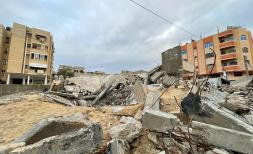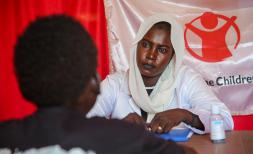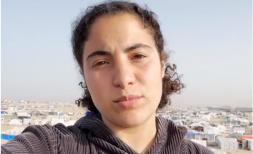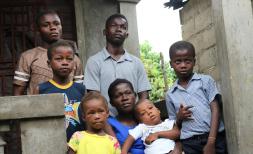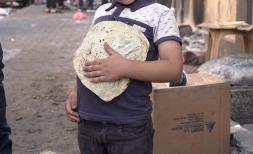Planetary Health: Addressing climate, health and equity together
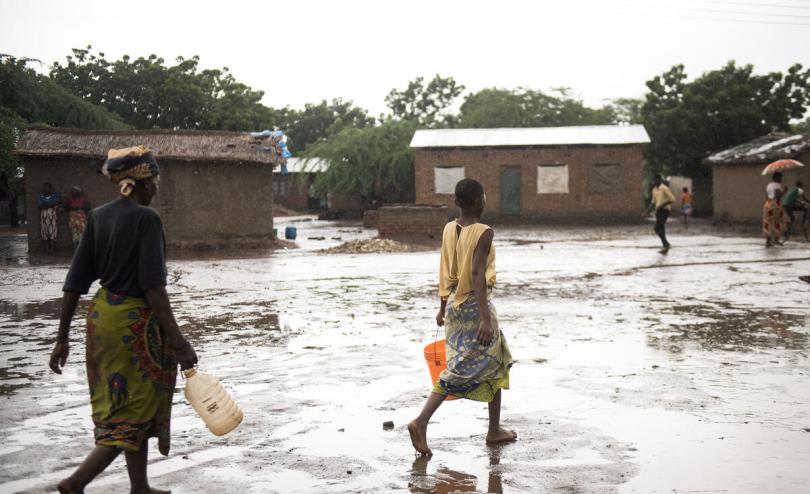
Ethel, 12, collecting water with her grandmother in their displacement camp, Malawi. Thoko Chikondi/Save the Children.
Scientists working at the science-policy interface have a shared interest in mobilizing science for impact – through informed decision-making, policy, advocacy, and solutions on the ground. How we do this is just as important as achieving that impact.
Planetary health is the foundational framework of understanding the environment and health nexus challenges we face today. Increasingly, planetary health is the foundation of how organizations such as my own are operationalizing programming, evidence-based policy and advocacy.
Planetary health says that unless we dramatically change the way we currently use our natural resources, we risk the health of human civilization [1]. Planetary health makes explicit the state of natural systems such as our climate, forests, wetlands and oceans in influencing health. Human-driven global environmental changes such as climate change, land use change and biodiversity loss have the potential to disrupt the progress of humanity because they affect the provision of food and safe drinking water and the regulation of our air; and, because they have the potential to exacerbate already existing socially-mediated risks such as displacement [2].
The Rockefeller Foundation-Lancet Commission on Planetary Health Report’s key message was that while we have made significant gains in health and development over the last 50 years, they are likely to be reversed by the unprecedented global environmental changes such as climate change which we are now experiencing. The second key message was that reversals can be minimized if the drivers and consequences of global environmental changes are understood, and this understanding is reflected in policy and planning.
An example of planetary health that is becoming more salient in our daily lives is the health impacts of a rapidly changing climate. There are direct (e.g. heat stress), indirect (e.g. monsoon flooding, air pollution), ecosystem-mediated (e.g. vector-borne disease), and other pathways by which climate change can affect health.
The most recent IPCC assessment report warned that climate impacts will happen simultaneously in ways that may be hard to predict. Underprivileged groups such as children, women and the poor, may be disproportionately adversely affected [3]. A recent study found that under current Paris Agreement country commitments, a child born in 2020 will experience on average twice as many wildfires, 2.8 times the exposure to crop failure, 2.6 times as many drought events, 2.8 times as many river floods, and 6.8 times more heatwaves across their lifetimes, compared to a person born in 1960 [4]. The impacts will be greater for some children – those living through conflict; those most severely impacted by COVID-19; and, those experiencing inequality and discrimination on the basis of gender, disability, displacement or other factors [5].
Addressing the health impacts of climate change is critical because climate adaptation and mitigation planning by countries cannot ignore health. Doing so could result in tradeoffs and unintended consequences which could ultimately undermine our well-intentioned efforts to improve health.
Climate change increases inequities, in the present and for future generations. Climate and health is a climate, health and equity challenge – these must be addressed together. At Save the Children, we developed an organization-wide strategy and programming which are organized to address climate, health and equity through:
- Improving understanding of the multi-sectoral impacts of, and interconnections between, human activities, climate and health as well as the social determinants which contribute to it
- Fostering community actions to identify, test, evaluate and scale interventions with climate, health and equity benefits to help communities prevent or reduce adverse impacts
- Supporting cross-sectoral governance on climate and health through the use of integrated data and decision support tools
- Strengthening skills and leadership capacity of communities to engage in co-design and implementation of evidence-based actions on climate and health
- Developing multiple-benefits based advocacy to engage public and private sectors on climate and health
In Niger, we are conducting a project to integrate data on drought, household economies, and malnutrition risk to develop early warnings so that governments can take anticipatory action to reduce risks to health and livelihoods through improved cash transfer and other programs to improve quality of the diet of children and families. In Laos PDR, we are developing a project with the Government’s Ministries of Health and Natural Resources and Environment along with other partners to adapt to climate change by strengthening health system resilience and also supporting the government’s mitigation goals.
We are taking a systems-based approach to address climate, health and equity. Sustainable solutions to climate-sensitive health challenges will require policies across health and other health-influencing sectors including water, agriculture, energy, and transport.
Fundamentally, solutions will require meaningful, inclusive engagement of communities - youth, women, other disadvantaged groups, decision makers, academia and community leaders/influencers - to identify their greatest threats to health from climate change, their root causes, and increase visibility for who is most at risk and how. This shared understanding is the first step to help identify communities’ priority actions on climate which can help them move towards the future they want for their health. Researchers, policymakers, implementers, and donors should invest in applied science-based tools and engagement models which support how communities can get there.
This blog article was originally published in Intl Science Council website.
[1] Whitmee, S. et al. (2015). "Safeguarding human health in the Anthropocene epoch: report of The Rockefeller Foundation–Lancet Commission on planetary health." The Lancet 386.10007, 1973-2028.
[2] Frumkin H, Haines A. Global environmental change and NCD risk. Annu. Rev. Public Health 2019; 40:27.1-27.22.
Millennium Ecosystem Assessment (MEA). Biodiversity. In: Mace G. et al., eds. Millennium ecosystem assessment: current state and trends: findings of the condition and trends working group ecosystems and human well-being. Washington, DC: Island Press, 2005.
[3] IPCC (2022). WGII Sixth Assessment Report.
[4] Thiery W, Lange S, et al. Intergenerational inequities in exposure to climate extremes. Science 2021; 6564: 158-60.
Montira Pongsiri is a Senior Advisor on Climate and Health at Save the Children. Dr. Pongsiri was the first Science Advisor at the U.S. Mission to the Association of Southeast Asian Nations (ASEAN) in Jakarta, Indonesia where she led the Mission’s efforts to work with Member States to apply science and technology to support ASEAN’s sustainability goals and to strengthen the capacity of science-based policymaking through programs such as the ASEAN-US Science and Technology Fellows Program. She is a Council Member of the Southeast Asia Science Advice Network (SEA SAN).
